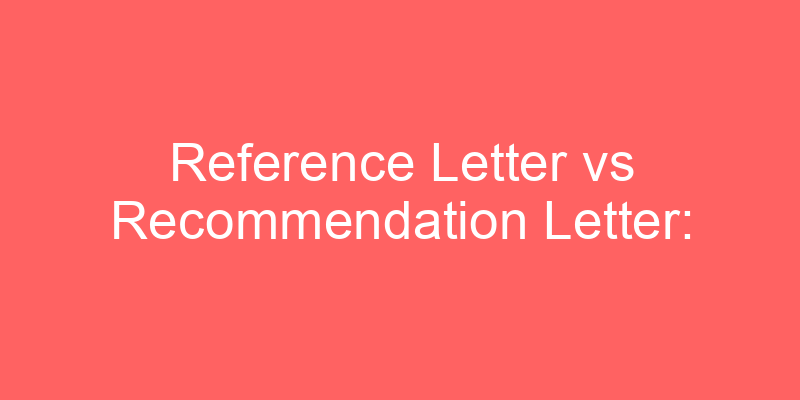Reference Letter vs Recommendation Letter for Job Search Success
Understanding the Difference
In the realm of job applications, knowing the distinction between a reference letter and a recommendation letter can significantly impact your candidacy. A reference letter typically verifies your past work experience, character, and skills, often from a colleague or supervisor. On the other hand, a recommendation letter goes beyond verification, offering endorsements and personal insights into your qualifications, usually from someone who has directly supervised or worked closely with you.
When to Use Each
Knowing when to use these letters is crucial. A reference letter is often requested by employers during the initial stages of the hiring process to confirm your background. It’s instrumental in validating the claims made in your resume and during interviews. Conversely, a recommendation letter is typically solicited when you’re nearing the final stages of a job application. It serves to highlight your unique strengths and qualities that make you an ideal candidate.
Key Elements of a Reference Letter
A well-crafted reference letter should include:
- Details about your job title and responsibilities.
- Confirmation of your tenure and work ethic.
- Insights into your character and professionalism.
For example, a reference letter might describe how you handled challenging projects or contributed to team success, providing specific examples of your skills in action.
Essential Components of a Recommendation Letter
On the other hand, a recommendation letter should encompass:
- An introduction to the recommender and their relationship to you.
- An assessment of your skills and abilities.
- Concrete examples of your accomplishments and impact.
For instance, a recommendation letter might narrate a situation where your leadership skills were pivotal in achieving a significant project milestone, demonstrating your ability to excel in challenging environments.
Strategic Use in Job Applications
Strategically leveraging these letters can enhance your job search efforts. When applying for a position, provide a reference letter upfront to validate your professional history and credibility. As you progress through interviews and become a finalist, supplement your application with a compelling recommendation letter to showcase your unique attributes and endorsements from respected sources.
Conclusion
Understanding the nuances between reference and recommendation letters empowers you to present a comprehensive view of your qualifications during the job search process. By securing strong endorsements and verifications, you not only validate your credentials but also differentiate yourself as a standout candidate in a competitive job market.
Reference Letter vs Recommendation Letter
Understanding the Difference
When navigating the job market, understanding the nuances between a reference letter and a recommendation letter can significantly impact your application’s success. Both documents serve to endorse a candidate, but they play distinct roles in the hiring process.
Reference Letter Defined
A reference letter, often requested by employers, provides insights into a candidate’s character, work ethic, and skills from someone who has worked closely with them. It typically confirms details such as employment dates, job responsibilities, and personal attributes that are relevant to the job.
Recommendation Letter Explained
On the other hand, a recommendation letter goes beyond factual information; it offers a personal endorsement of the candidate’s qualifications and suitability for a specific role. This letter is usually written by someone in a position to evaluate the candidate’s professional abilities and potential contribution.
When to Use Each?
Knowing when to use a reference letter versus a recommendation letter is crucial:
- Reference Letter: Use when an employer requires verification of your work history and character, such as during background checks or initial screenings.
- Recommendation Letter: Use when applying for a job or academic program where a personal endorsement from a credible source can enhance your candidacy.
Resume Strategies for Effective Job Search
Crafting a Targeted Resume
One of the most critical aspects of a successful job search is a well-crafted resume that highlights your skills and experiences relevant to the position you are applying for. Tailor each resume to the specific job description to demonstrate your suitability clearly.
Highlighting Key Skills and Achievements
Use bullet points to list your key skills and achievements prominently. Quantify your accomplishments where possible to provide concrete evidence of your capabilities. For example, instead of stating “managed a team,” specify “led a team of 10 sales professionals, achieving a 30% increase in annual revenue.”
Utilizing Action Words
Begin each bullet point with action verbs to create a dynamic and engaging resume. Words like “achieved,” “implemented,” “resolved,” and “initiated” demonstrate your proactive approach and make your achievements stand out to potential employers.
Formatting and Layout Tips
Keep your resume format clean and professional. Use clear headings, bullet points, and adequate white space to enhance readability. Ensure consistency in formatting throughout your resume, including font style and size.
Career Path Visualization
| Entry-Level | Mid-Level | Senior-Level | Executive-Level |
|---|---|---|---|
| Junior Associate | Project Manager | Department Head | Chief Operating Officer |
| Intern | Senior Project Manager | Vice President | Chief Executive Officer |
| Assistant | Program Manager | Director | Board Member |
Resume FAQs
- What is the ideal length for a resume? Your resume should ideally be one to two pages long, depending on your level of experience and industry standards.
- How important is customization of resumes? Customizing your resume for each job application increases your chances of standing out to employers who are looking for specific skills and qualifications.
- Should I include references on my resume? It’s best to provide references on a separate sheet when requested by the employer. Focus your resume on showcasing your qualifications.
`
Generate Your NEXT Resume with AI
Accelerate your resume crafting with the AI Resume Builder. Create personalized resume summaries in seconds.




